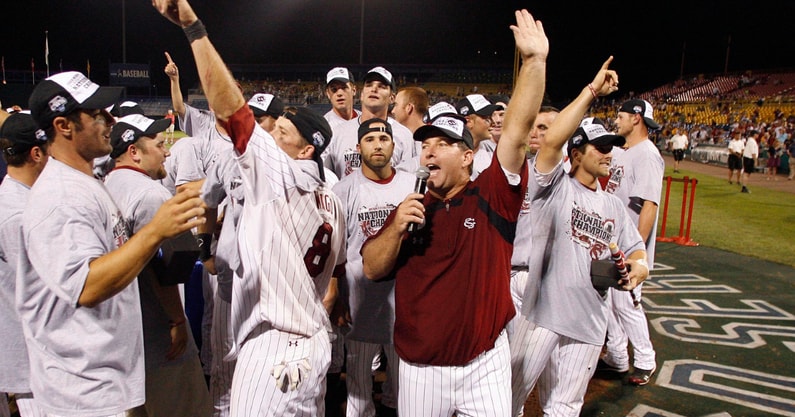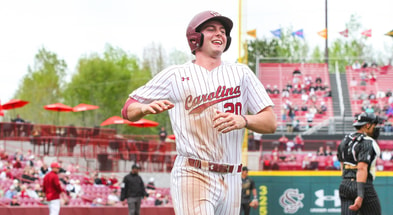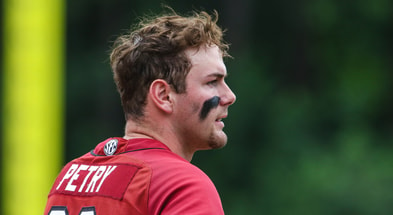Stories behind Ray Tanner's impact on South Carolina baseball

He’s never wanted it to be all about him. Sure, it’s his big day. But it’s no different for him than the national championships or the other accolades and honors he earned when he was coaching. It’s always been about the people around him.
When his next accomplishment comes on Saturday, he wants it to be about his players, coaches, friends, family, the list goes on. All those who helped him get here. But this is Ray Tanner’s moment and no one else’s.
Starting this baseball season, South Carolina’s Founders Park will now be known as “Ray Tanner Field at Founders Park.” Tanner will be recognized in a pregame ceremony before the Gamecocks take on Sacred Heart. A logo featuring his signature and the field’s new name will reside behind home plate moving forward.
“It’s not about me. I’m just the guy that was driving the bus at a good time,” Tanner said. “You go back in history; I knew what Bobby Richardson did here. I knew what June Raines did here. I was able to capitalize on the foundation that they laid, and they were in a position to win national championships, as well. They helped us get there.
“The players that played and then after that, it’s a collective group. So, when I saw the first stencil of the name on the field, it was like that’s just a representation of what’s happened here for Carolina baseball.”
As South Carolina gets set to celebrate Tanner this weekend, a few of his former players shared their stories behind the man they called their head coach.
Longing to win it all
When Tanner first arrived at South Carolina, along with Jim Toman, one of his assistant coaches from NC State, he expected to win. It wasn’t going to be easy taking over a program that had just gone 25-28 in 1996, but he knew they could get it done.
“We were inheriting a team that wasn’t real good,” Tanner said, “but the two of us thought we would get good enough players to win. … We knew we were going to get players and then we did.”
But as he learned, it was a steep climb to get to the top. It took until 2000 for the Gamecocks to reach a Super Regional, where they lost in three games to Louisiana–Lafayette. The next year, they got back to the Supers, only to fall short again, losing to Stanford in a decisive game three. Both season-ending losses came by one run apiece.
Tanner never spoke to his teams about winning the SEC or the SEC Tournament. Those things weren’t the end goal. He believed if they were in a good position, good things would happen. But when they couldn’t seem to make it to Omaha, he wondered when or if it would happen.
“I had wrestled with those two years. It’s just a game. You gotta be in a position to win and you don’t. But is your time coming?” he said.
[Join GamecockCentral: $1 for 7 days]
It took longer than he may have initially anticipated, but eventually, he led South Carolina to the top of college baseball. The Gamecocks went to the College World Series in three straight seasons from 2002-04. Then they finally won it all in 2010.
“It was surreal. We go, we win, and we have the big celebration on the field. Guys were kind of just bouncing around hotel rooms, just kind of soaking it all in. Nobody slept and we all got on the flight back and we immediately went to the CLA for a greeting or whatever,” said Ethan Carter, who pitched at South Carolina in 2010 and 2012.
“(Tanner) was just locked in the whole time. You could tell how much it meant to him. I mean, he’s a serious man, but he had a smile on his face pretty much from the time that final pitch happened till we were done signing the autographs and doing the greeting at Colonial Life. I don’t think I saw a smile leave his face.”
Tanner, who had longed to get South Carolina back to this point, started to soak it all in. At the championship parade in downtown Columbia, he couldn’t help but smile while riding down Main Street with his wife, Karen, and three children.
This was a moment nearly 14 years in the making. His celebrations only lasted so long, though. Eventually, it was time to get back to business and do it all again.
“He definitely savored it and enjoyed it,” Carter said. “But he also knew it was like, ‘Okay.’ We had a good thing there. We had enough guys returning that I think he knew was like, ‘All right, on to the next thing. Let’s get ready for next year.'”
A tough coach
The most common word that’s been used to describe Tanner is tough. His tenure as South Carolina’s head coach was nothing short of successful. He won 738 games over 16 seasons, led the Gamecocks to six College World Series appearances and won two national championships.
All the glory didn’t come easy. Tanner was hard on his players. But it’s what led to the great years that have turned South Carolina into a recognizable baseball program to this day. And it all started with how he coached his practices.
“Practices were no joke. When you did something stupid, you knew about it,” said Tanner English, an outfielder at South Carolina from 2012-14. “You were running, you were making up for it. He would call you out in a heartbeat.”
That was just the expectation when players came to South Carolina, though. And for those who helped the early 2010’s teams come out on top in Omaha, they heard practices from previous seasons were much tougher. Nonetheless, these days at the field weren’t a cakewalk.
“I mean, he ran it as close to a professional type of program as you could,” Carter said. “Expectations were clear. You didn’t go into a situation, thinking one thing and then finding out another. He was very upfront, and he didn’t sugarcoat much.”
Players knew they had to be at their best whenever Tanner was watching. At the same time, though, they were allowed to make mistakes here and there. There would even be times where Tanner would crack jokes, though some guys couldn’t always tell if he was being serious or not.
“Sometimes his jokes were just so intense, you were like, ‘Is he joking? Or is he serious about that?’ And you needed some of that uncomfortability where you weren’t sure,” said LB Dantzler, an infielder at South Carolina from 2012-13.
When it was time to get serious, Tanner expected everyone to perform to the level he knew they could. And if things weren’t being done how he had envisioned, he wouldn’t be afraid to make a change.
During one practice in Dantzler’s first season in Columbia, he was fielding live ground balls at third base while teammates Christian Walker and Brison Celek were taking batting practice. As he later learned from his pro ball days, this wasn’t something players normally did when hitters were taking swings. But here Dantzler was trying to make a play on any ball that came his way. And Tanner counted on him to do just that.
“I took so many balls off the knee, off the chest. I would get beat up, and if I ever missed one, he would stop batting practice for just like three seconds,” Dantzler said. “He’d stop throwing, just kind of stare at me, give kind of a look of disappointment, and then just go back. Never said a word. Just would kind of look if you missed one.”
With Tanner’s coaching style, though, there was always a reason for how he did certain things. Dantzler went on to field .972 with only five errors in 2012 while starting at third base. At the time, it may have just seemed like his coach pushing him past his limits. But looking back, it helped shape the season he would end up having.
“I attribute so much of my defensive success in the 2012 season to that,” he said. “Just where he had this expectation that I was going to stand in there and catch every ground ball. But I vividly remember that look that he would give. Kind of stop, tilt his head sideways, and you’re just like, ugh, come on.”
Strong belief in his players
Locked into a 1-1 tie in the 12th inning of an elimination game against Oklahoma in the 2010 College World Series, Tanner called on Carter to come in and pitch a scoreless frame. If so, he would give South Carolina a chance to win it in the bottom of the inning.
But Carter didn’t have much of a chance to settle in before Tanner pulled the plug on his outing.
On the second pitch he threw, he gave up a go-ahead solo homer to break the tie and give the Sooners the lead. All Carter could do was crouch down with a blank expression on his face. By the time he stood back up, Tanner was already on his way out to the mound to make a pitching change.
This was easily the hardest moment of Carter’s baseball career. He made his way back the dugout and sat down on the bench with his head in his hands. There was no one feeling more alone and vulnerable than he did. And that’s when Tanner, who had just taken him out, came over to him.
“He came up next to me, pat his hand on my shoulder, and told me we’ll get through it together. And that was that,” Carter said.
Win tickets to USC-Clemson baseball (Sunday game in Columbia)
Fortunately for Carter, the burden of what he had just done didn’t last very long. South Carolina scored a pair of runs in the bottom of the 12th to win in walk-off fashion and advance to the semifinals to face Clemson. In what felt like the lowest of lows, Carter was thankful that Tanner, for as tough as he was, took the time to give him some encouragement that it would all be okay. And it would be.
Top 10
- 1
Brad Stevens
Makes Indiana intentions clear
- 2
Auburn vs. Alabama odds
Point spread released
- 3
Dawn Staley
Admonishes rev-share reversal
- 4Hot
March Madness
Predicting Top 16 reveal
- 5Trending
Joel Klatt
NFL Mock Draft
Get the On3 Top 10 to your inbox every morning
By clicking "Subscribe to Newsletter", I agree to On3's Privacy Notice, Terms, and use of my personal information described therein.
“Knowing that the season could’ve been over in three outs, but he took the time to come give me a little grace in that moment, that’s something I’ll never forget,” Carter said.
While Tanner’s expectations were always high, he always had the utmost confidence in his player’s abilities to become who he thought they could be.
“I remember one day he pulled me up into his office. He said, ‘English!’ And I said, ‘Yes sir?’ He said, ‘Do you know what your batting average is when you just make contact with the ball?’ I said, ‘No, what kind of stat is that?’ He said, ‘Do you know if you just touch the freaking baseball what you’re hitting?'” English said.
“I think he told me some crazy number. I was hitting like .448 or something like that when I just made contact. So he just grabbed me by the shoulder and said, ‘Tanner. Just freaking tap the ball and run!’ As much as he challenged us, he still built confidence and made us believe in ourselves.”
Throughout his time at South Carolina, he coached countless great players, far too many to keep count of. One of those players was Adam Matthews, who played for him as an outfielder from 2009-12.
When Matthews, a Lexington native, was a sophomore at White Knoll High School, he took a visit to South Carolina and watched the team take practice at old Sarge Frye Field. Sitting right next to him, Tanner provided some important words that shaped the type of career he would go on to have.
“I’ll never forget him telling me that he looks at me as an SEC-type caliber player that could come in and have an impact,” Matthews said. “As a 16-year-old kid at that time, that was someone who I looked up to.”
Matthews had a great four-year stint with his home state school as a key part of the Gamecocks’ championship-winning teams. He didn’t have the greatest senior year, only hitting .236 with five homers and 26 RBI. But as the captain of the team, Tanner expected more from him beyond his on-field performance.
“The chats that we had, the conversations that we had, what he expected of me, what he knew I was capable of,” Matthews said. “Of course, we all want to be putting up statistically great numbers. However, he also looked at me as a captain and someone who could also help navigate the personality types on the team, too, and what those last couple years looked at and how to translate new guys into that role.”
Matthews went on to close out his career on a high note, helping South Carolina get back to the College World Series for a third consecutive year. During that postseason run, he earned NCAA Regional MVP and All-Tournament Team honors after hitting .385 with a homer and six RBI in the Columbia Regional.
“He’s definitely helped shape me into who I am today,” Matthews said of Tanner. “Things become tough, life becomes tough. When you’re faced with those adversities, how do you, number one, challenge yourself, but how do you overcome those obstacles? So having someone like him as a coach, maybe in the time I’m like, gosh, he’s so hard on me. But at the end of the day, what he was doing was shaping me for not only my baseball future but also life in general.”
More than just their tough coach
English had never really seen this side of Tanner before. He had always been used to seeing the hard-nosed baseball coach who expected excellence and nothing less.
But shortly after Tanner moved on from his coaching days to become South Carolina’s athletics director in 2012, English surprisingly ran into his former coach before a Gamecock football game. That was when English, hanging out with his teammates Grayson Greiner, Joey Pankake, TJ Costen, and Joel Seddon, heard Tanner tell them something they never expected to hear.
“He stopped us and said, ‘Guys, I want you all to know this. I never told y’all this before.’ But he said, ‘I absolutely love each and every one of you,'” said English. “He said, ‘I have to be tough on y’all as a coach. That’s just who I was and what I did. That was my style of coaching. But now that I’m not y’all’s coach anymore, I just want y’all to know how much I love y’all and how much I appreciate y’all.'”
It was one of those moments where English was completely caught off guard and had to make sure he was hearing Tanner right. After all, this was the same man who never let anything slide when English played for him as a freshman.
“He gave us all a big hug,” English said. “I know it’s not this jaw-dropping story, but I just think it speaks volumes to the type of guy he is. It meant enough to me for him to say that to us the next year where I’m still telling people about it 10 years later, however long it’s been.”
For as tough as Tanner was, that’s what it took to win as South Carolina did during his tenure.
“He was definitely setting the tone of what he knew we were capable of,” Matthews said. “Thankfully we had a lot of hard-nosed players that were willing to take those discussions and chats, locker room chats if you will, and turn those into motivation and turn those into a positive.”
While he might not have always shown it, he cared deeply about all of his players. As his players pointed out, Tanner’s toughness came from the love he still has for them to this day. They knew that’s what it was all about.
“I know he’s passionate about baseball, but I think he’s passionate about the people he’s around,” Matthews said. “Even now in today’s time over the years, if I needed a recommendation or if I just wanted to say hey to him, he’s always been open arms to his past players. … That’s where, as a player, we saw that he cared with him being tough. He shows you that he cares because he will devote time and give you time to engage, talk to him, and catch up.”
“I learned a ton getting to see his leadership style. Now I’m managing employees, a different kind of leadership, but I think back to my playing days a lot at work, and how I can implement some of those in him. But he did everything with a sense of like, ‘Hey, we’re all in. Like this is what we’re doing,'” Dantzler said.
“I think going back to school now, I love when I get to see him at the field and get to stop and say hey. He still remembers my wife’s name. I don’t know how you can do that with all the players and people that he’s around, but he just remembers so many little details. And now it’s a completely different relationship, obviously, where you’re an alumni. And it’s just made going back to school and being around the athletic department and all of that stuff just so much more enjoyable.”
Above all else, Tanner not only helped his players reach their full potential, but he also shaped them into the people they’ve now become.
He held us accountable and made us the best versions of ourselves that we could possibly be,” English said. “I think that was the most special thing about him.”

























